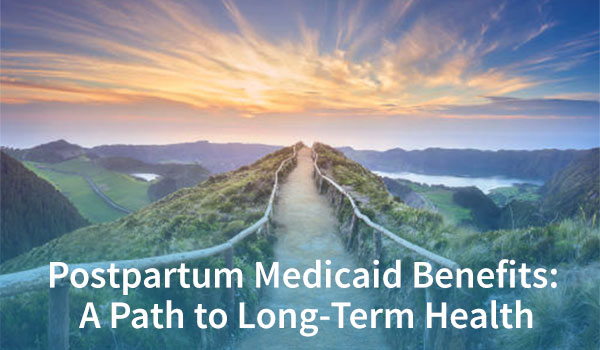 Filed Under: Health Economics | Maternal Health
Filed Under: Health Economics | Maternal HealthPostpartum Medicaid Benefits: A Path to Long-Term Health

As states wrestle with COVID-19-related state budget deficits, Medicaid may soon find itself in the crosshairs. While the short-term impact on adult health is significant, the long-term consequences for children are even greater. Medicaid cuts could negatively impact a child over their lifetime – not only for their health but in areas of disability, education, and financial security.
Medicaid plays an outsized role in the nation’s pediatric health, covering nearly 39% of children nationwide and financing 43% of all births (2018). Cuts to Medicaid are amplified by Federal matching. When a state cuts a dollar, the actual amount (state + federal) ranges from $2.28 to $6.23.
A recent study by the Commonwealth Fund1 explored how Medicaid coverage of pregnant women not only benefits children during their childhood but through their adult life. Long-term benefits from adequate coverage include higher birth weights, reduced chronic conditions, ER visits, dropout rates, and mortality rates, and increased likelihood of financial security from a college degree.

The Need for a Fourth Trimester
The study noted the unique role that postpartum care plays in long-term health. Postpartum care is woefully inadequate in the U.S. – often consisting of a single health care appointment between two and six weeks after delivery. Only 61% of Medicaid mothers schedule a postpartum visit – a figure that can range as high as 72% in Rhode Island and 23% in Oklahoma. Improving these care gaps offers a clear path for improving maternal health and the health of the child.
The American College of Obstetricians and Gynecologists recommended providing standard care for a “fourth trimester” to manage chronic conditions, offer breastfeeding support, screen for mental health disorders, and support contraception planning.
Maternal mortality and postpartum depression are two critical areas that a Fourth Trimester could address.
Postpartum Depression
Postpartum depression affects about one in nine postpartum women. Among low-income mothers, 40–60% report depressive symptoms. Mothers with postpartum depression may experience mood swings, crying spells, anxiety, and sleeping difficulties. The infant and child’s well-being can suffer from missed well-child visits, incomplete immunizations, and greater use of urgent care instead of pediatric visits.

Maternal Mortality
One-third of pregnancy-related maternal deaths occur during the one-year postpartum period. Maternal morbidity and mortality are most likely to exist in Medicaid populations who could benefit from standardized postpartum care.
The Need for Standardized Postpartum Care
Modern medicine is organized around standardized care and clinical guidelines, yet postpartum Medicaid coverage is not only insufficient, it varies from state to state.
ProgenyHealth takes an active approach to helping women and families in the Medicaid population navigate the healthcare system. In our day-to-day case management work, we recognize the value of proactive, standardized support to ensure positive outcomes not only for the initial NICU period but for the first year postpartum as well.
We recognize the value of postpartum home visits. States that offer these programs see increased breastfeeding rates and decreased emergency medical care.
By promoting enhanced Medicaid coverage for postpartum care, ProgenyHealth hopes to support infants and their families to stay on a path towards long-term health and well-being. We ask our health plan partners to advocate for expanded Medicaid coverage. For our patient population, we ask you to become informed on the crucial role that Medicaid expansion and postpartum care play in your children’s long-term health and success.
- www.commonwealthfund.org/publications/issue-briefs/2020/dec/short-term-cuts-medicaid-long-term-harm






 Prev
Prev